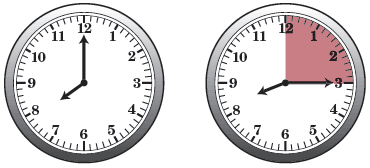Quarter hour
A quarter hour is a unit of time equal to 15 minutes. The terminology comes from there being 60 minutes in 1 hour. Thus, a quarter, or ¼ (or 0.25) of 60 minutes is 60/4 = 15 minutes.
Telling time in quarter hours
There are two different ways to tell time using quarter hours.
Quarter to
When telling time using quarter hours, saying "quarter to" indicates that there are 15 minutes before the next hour. For example, "quarter to 1" means that the time is 12:45, since it is 15 minutes before 1.
Quarter past
When telling time using quarter hours, saying "quarter past" indicates that 15 minutes have passed in the current hour. For example, "quarter past 1" means that the time is 1:15, since it is 15 minutes after 1.
Quarter hours are most commonly used to tell time in this manner. Although we could use "quarter past" and "quarter to" to reference any time, it is not common for someone to say "quarter past 2:41," which is 2:56. In such cases, it would be easier to simply say "two fifty six" rather than "quarter past two forty one." Also, while it would be technically correct to say that 10:30 is "two quarters to eleven," this is not a typical way of telling time. A person may understand you if you say this, but it could also cause some confusion. Instead, someone is more likely to say that it is half past 10 to indicate that it is 10:30, or they may simply say "ten thirty."
Analog vs. digital clocks
Reading time off of a digital clock is relatively simple compared to reading time off of an analog clock. However, it is easier to indicate specific periods of time (such as a quarter-hour) on an analog clock since analog clocks are most typically designed as circles, and can be broken up into slices/regions that are likely familiar to those who have studied topics such as fractions, ratios, and proportions. Below is a representation of a quarter hour passing on an analog clock, from 8:00 to 8:15.

The time above can either be read as "eight fifteen" or "quarter past eight." Note that the use of "quarter" as a modifier of a measurement of time is largely only used when telling time using minutes. For example, while it would technically be correct to say that a period of 15 seconds passing on a clock is a "quarter minute," this is not commonly used. "Quarter day" is also not used to describe a period of 6 hours.
Did you know?
Notice the "quart" in "quarter." There are four quarts in a gallon, four quarters in a dollar, four quarter-hours in an hour, and four quarters in a football game. Quart comes from a Latin word meaning four or fourth.
